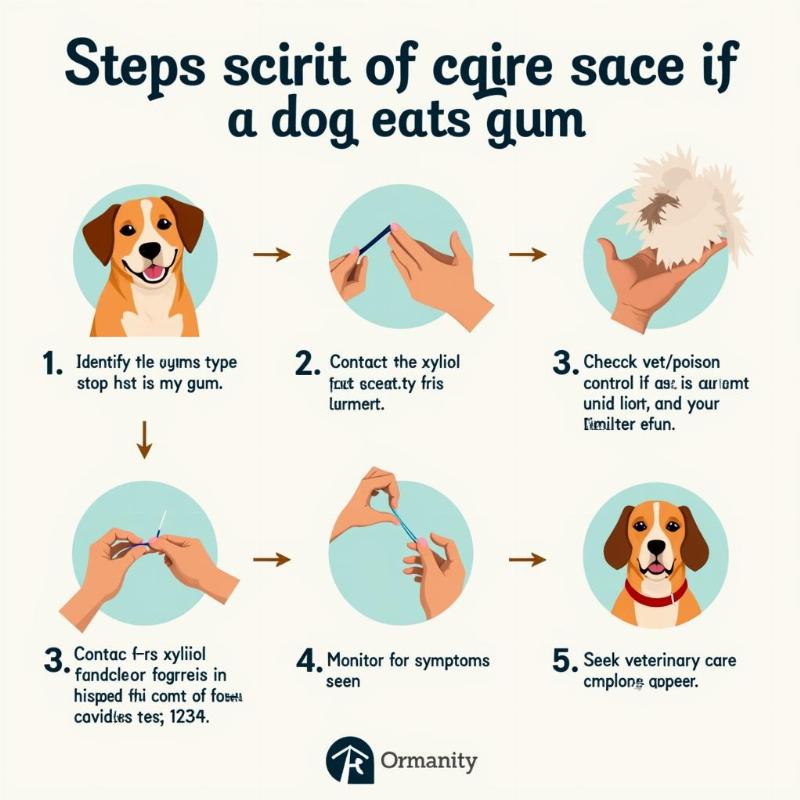Xylitol, an artificial sweetener commonly found in sugar-free gum, is extremely toxic to dogs. Even small amounts can cause a rapid drop in blood sugar (hypoglycemia), leading to weakness, seizures, liver failure, and even death. Understanding the dangers of xylitol and other ingredients in gum is crucial for responsible dog ownership in the United States. So, what exactly makes gum so harmful to our canine companions?
The Dangers of Xylitol in Gum for Dogs
Xylitol is the primary culprit in gum’s toxicity to dogs. While it’s harmless to humans, xylitol triggers a massive release of insulin in dogs. This insulin surge drastically lowers blood sugar levels, potentially causing life-threatening hypoglycemia. Symptoms of xylitol poisoning can appear within 15-30 minutes and include vomiting, lethargy, loss of coordination, seizures, and coma.
If you suspect your dog has ingested xylitol-containing gum, immediate veterinary attention is critical. Time is of the essence in treating xylitol poisoning. Your veterinarian may induce vomiting, administer intravenous dextrose to stabilize blood sugar, and monitor liver function.
Other Ingredients in Gum That Can Harm Dogs
Beyond xylitol, other ingredients in gum can pose problems for dogs. Many gums contain artificial flavors, colors, and preservatives that can cause gastrointestinal upset, including vomiting and diarrhea. Some gums also contain caffeine or other stimulants that can be harmful to dogs, especially smaller breeds.
Chewing gum itself can also be a choking hazard, particularly for small dogs or puppies. The sticky texture can obstruct the airway or cause intestinal blockage if swallowed. Always keep gum and other potential hazards out of reach of your furry friend.
How to Protect Your Dog from the Dangers of Gum
Prevention is key. Store gum and other xylitol-containing products securely in cabinets or drawers out of your dog’s reach. Be mindful of guests who may unknowingly leave gum within a dog’s access. Educate family members and friends about the dangers of xylitol for dogs.
When choosing treats or dental chews for your dog, always check the ingredient list to ensure they are xylitol-free. Opt for natural dental chews or toys designed specifically for dogs.
Regular dental care is crucial for your dog’s overall health. Brushing your dog’s teeth regularly and providing appropriate dental chews can help prevent plaque and tartar buildup, reducing the need for your dog to seek out other chewing sources, like gum.
What to Do if Your Dog Eats Gum
If your dog eats gum, don’t panic. First, determine whether the gum contained xylitol. If it does, immediately contact your veterinarian or the ASPCA Animal Poison Control Center. Even if the gum doesn’t contain xylitol, monitor your dog for any signs of gastrointestinal upset, choking, or other unusual behavior. If you notice any concerning symptoms, contact your veterinarian.
dental chews for dogs bad breath
 Dog eating gum – what to do
Dog eating gum – what to do
Conclusion
Understanding the dangers of gum, particularly the toxicity of xylitol, is essential for responsible dog owners in the United States. By being vigilant about what your dog has access to and educating yourself about potential hazards, you can help keep your canine companion safe and healthy. Remember, prevention is always the best medicine.
FAQ
- What is the most dangerous ingredient in gum for dogs? Xylitol is the most dangerous ingredient.
- How much xylitol can be toxic to a dog? Even small amounts of xylitol can be toxic.
- What are the symptoms of xylitol poisoning in dogs? Symptoms include vomiting, lethargy, loss of coordination, seizures, and coma.
- What should I do if my dog eats gum with xylitol? Contact your veterinarian or the ASPCA Animal Poison Control Center immediately.
- Are there any safe alternatives to gum for dogs to chew on? Yes, there are many natural dental chews and toys designed specifically for dogs.
- How can I prevent my dog from eating gum? Store gum and other xylitol-containing products out of reach of your dog.
- What kind of dental care should I provide for my dog? Regular brushing and appropriate dental chews are recommended.
Beautdogs.us is your premier online destination for comprehensive and engaging information on dog care, breeds, and lifestyle in the US. We offer expert advice on everything from puppy training to senior dog care, ensuring you have the resources to provide your furry friend with the best possible life. Whether you’re a seasoned dog owner or just starting your journey, Beautdogs.us is here to support you every step of the way. Contact us today for personalized advice! Email: [email protected], Phone: +1 501-555-7529.